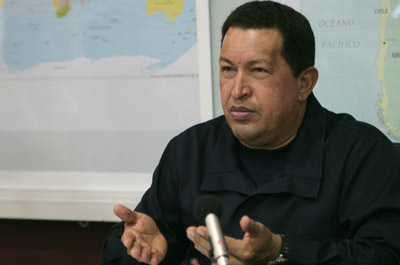Venezuelan President Hugo Chávez Frías has used cadenas—nationwide radio and television addresses that preempt programming on all stations—to challenge the private media’s news coverage and amplify the government’s voice. In his radio and TV call-in program, “Aló, Presidente” (Hello, President), Chávez often lambastes critics in the media and the political opposition.
Over more than a decade, Chávez has broadcast almost 2,000 cadenas. According to data from AGB Nielsen Media Research, the president has aired 1,995 cadenas from the time he took office in 1999 until late January 2010. Chávez has spent more than 1,300 broadcast hours on the air, the equivalent of 55 full days, AGB Nielsen found.
The Venezuelan president apparently does not fear over-exposure.
On Monday, he launched a new radio program called “Suddenly, With Chávez.” The show, which airs on state-owned Radio Nacional de Venezuela, does not have a regular schedule and, instead, will be broadcast at any time (midnight or dawn, even, says Chávez). The administration has “many things to report,” press reports quoted the president as saying.
Broadcasters have been penalized recently for not airing the Chavez’s speeches. On orders from the National Telecommunication Commission (CONATEL), cable and satellite providers stopped transmitting RCTV International and five other stations shortly after midnight on January 24. CONATEL alleged that the broadcasters violated a requirement to air Chávez’s speeches.
Ritmo Son, Momentum, America TV, American Network, and TV Chile have been allowed back on to cable and satellite since then, but RCTV remains dark. The station has sought an injunction lifting the ban from the Supreme Tribunal of Justice, according to an RCTV lawyer. Known for its harsh opposition views, RCTV is the country’s oldest private station, with 57 years on the air and on cable and satellite.
According to the country’s Law of Social Responsibility in Radio and Television, which has been widely criticized for its broad and vaguely worded restrictions on free expression, broadcasters must carry government programming when officials deem it necessary. That includes all live broadcasts of Chávez’s cadenas.
Although “Suddenly” will be aired on state radio only (at least for now), it reflects the president’s longstanding strategy to be his country’s dominant source of information.
UPDATED: We corrected the spelling of “cadenas” after a reader pointed out the problem.
